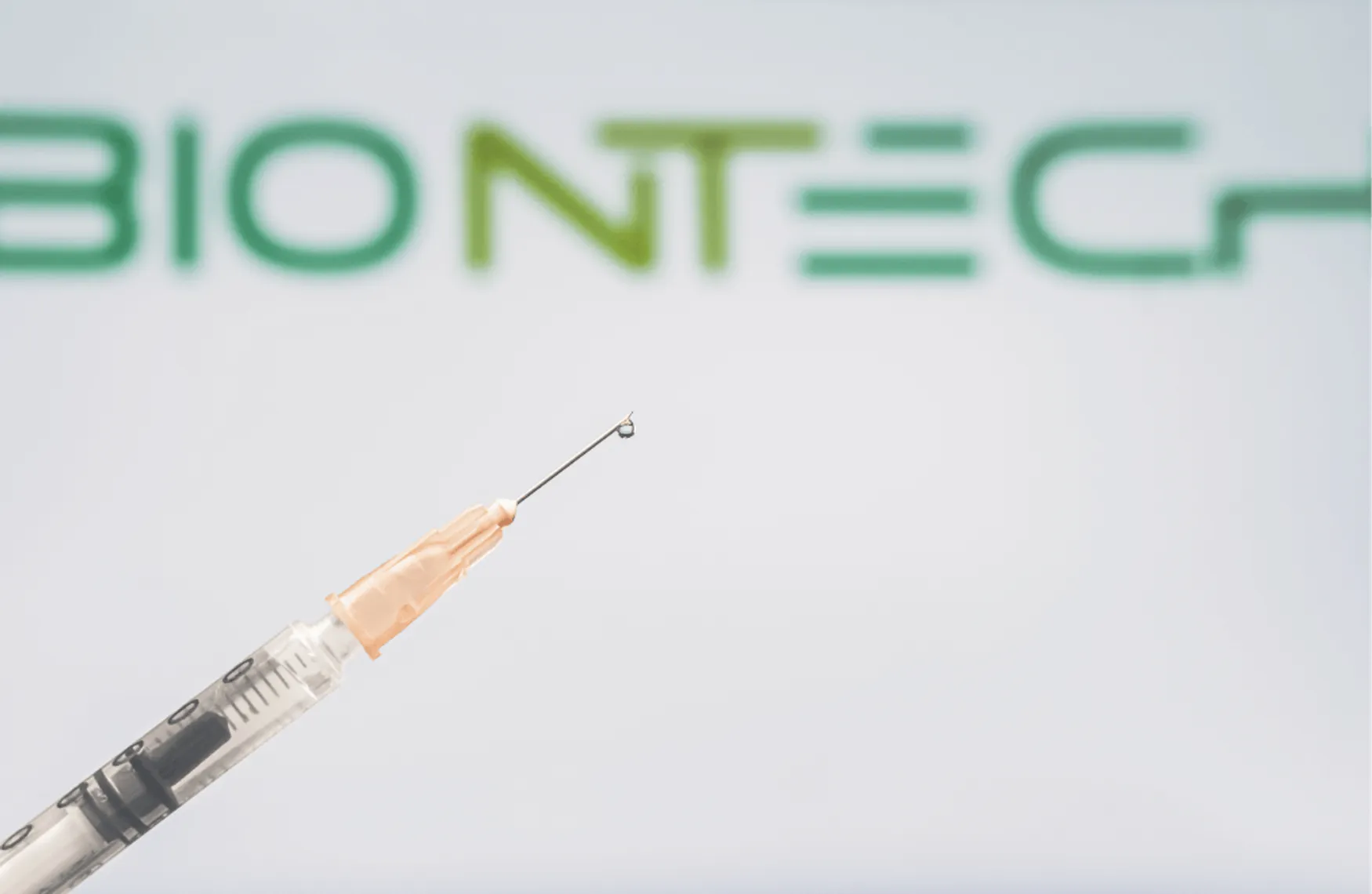How to trade BioNTech

Learn all about BioNTech, with information on the company’s history and share price journey, its share trading hours, and how to trade BioNTech shares with Capital.com.
Go to market page
What is BioNTech?
BioNTech SE is a German biotechnology company that gained international recognition for its development of the first widely approved mRNA-based Covid-19 vaccine in collaboration with Pfizer. Founded in 2008 by Ugur Sahin, Özlem Türeci, and Christoph Huber, the company initially focused on developing new types of immunotherapy for cancer. However, BioNTech's expertise in mRNA technology, which involves using a molecule called ‘messenger RNA’ to instruct cells to produce proteins that can fight diseases, proved pivotal in quickly developing a vaccine in response to the Covid-19 pandemic.
Aside from its work on Covid-19 vaccines, BioNTech is involved in various research and development projects targeting other infectious diseases, cancer, and potentially other areas where mRNA technology could be applied. The company's approach has opened new avenues in the field of genetic medicine, emphasising personalised and precision medical treatments.
In the 2023 fiscal year, the company’s revenue amounted to some €3.8bn.
What is the BioNTech share price history?
The BioNTech share price history starts with its listing on the Nasdaq Stock Exchange in 2019. The company sold 10 million American depositary shares (ADS) at $15 per ADS, valuing it at $3.39 billion. The share price surged following its listing as the Covid-19 vaccine was rolled out globally, moving above $450 in August 2021. However, the share price fell to trade in a range around $130-$160 in the following year, and lost ground in 2023 as vaccine sales plunged. Future share price activity will be driven by the company’s progress in clinical trials for other products in its pipeline, and the ability to secure new partnerships and regulatory approvals. Naturally, global health developments and market conditions will be critical to the direction the company and its shares take.
(Past performance is not a reliable indicator of future results)
What factors might affect the BioNTech live share price?
The BioNTech live share price can be impacted by a range of key sector-specific fundamental events. Here are a few of the main factors that traders should watch out for.
- Vaccine sales and developments: as BioNTech continues to profit from its Covid-19 vaccine, any news related to vaccine efficacy, new variants, or additional booster shots can significantly affect the stock price. For example, positive results from vaccine trials for new variants could lead to stock price increases and vice versa.
- Regulatory approvals: gaining or losing regulatory approvals for its vaccines and other therapeutic products can have a direct impact on BioNTech's market value. Approval of a new cancer vaccine by regulators could boost the share price, whereas regulatory setbacks could lead to declines.
- Partnerships and collaborations: BioNTech’s collaborations, like its partnership with Pfizer, are crucial. New partnerships or expansions of existing ones can positively influence the stock. Announcing a new strategic partnership for vaccine distribution in additional markets could drive up the share price. On the other hand, competitors forging stronger partnerships and innovating more effective products can naturally sink the share price.
- Research and development outcomes: The results of ongoing research into other vaccines and therapies contribute significantly to investor sentiment and stock performance. Breakthroughs in mRNA technology for other diseases could lead to an increase in the share price. However, factors such as negative news reports on drug efficacy, or reports of adverse side effects, can cause the stock to lose ground.
- Global health policies and pandemic response: decisions by governments and health organisations can affect vaccine demand and BioNTech’s business. Government mandates for vaccine boosters could lead to increased revenue forecasts, positively impacting the share price.
What are the BioNTech stock trading hours?
The BioNTech stock trading hours are Monday to Friday from 2:30am to 9:00pm (UK time).
If you choose to trade CFDs, you can follow the BioNTech stock performance live in euros with the comprehensive BioNTech share price chart.
Monitoring the company’s activity can help you to keep an eye out for any key fundamental or technical events that may affect short-term movements in the share value.
How to trade BioNTech shares with CFDs
If you want to take a position on BioNTech shares, you have two options. First, you can buy physical shares in the company through the exchange on which it’s listed. In this case, investing in BioNTech stock means you will own a share, or shares, in the company. This can be considered a long-term investment, as you’re hoping for the price to rise over time.
Alternatively, you can trade a derivative product such as a contract for difference (CFD) on the underlying BioNTech stock market price, and speculate on its price movements without actually owning the asset. A CFD is a financial contract, typically between a broker and a trader, where one party agrees to pay the other the difference in the value of a security, between the opening and closing of the trade.
Unlike physical share ownership, you can either hold a long position (speculating that the price will rise) or a short position (speculating that the price will fall). This is considered a short-term investment or trade, as CFDs tend to be used within shorter timeframes.
The key difference between buying physical BioNTech shares and trading through a derivative is the leverage that is employed with the latter. CFDs are typically traded on margin, which means that a trader has exposure to larger positions with a relatively small outlay. This amplifies the potential profits, but also the potential losses, making leveraged trading risky. You can learn how to trade shares in our comprehensive guide to shares trading.
To trade BioNTech stock CFDs with us, just sign up for a Capital.com account, and once you’re verified, you can use our advanced web platform or download our intuitive yet easy-to-use app. It’ll take just a few minutes to get started and access the world’s most-traded markets.
Why trade BioNTech CFDs with Capital.com?
Trading BioNTech CFDs with Capital.com means you’ll enjoy an intuitive, easy-to-use platform, 24/7 support, fair and transparent pricing, along with award-winning education to help build your experience in the markets.* You can seamlessly integrate our smart platform with elite third-party software TradingView and MT4, and refine your strategies with our risk-free demo.
*Awarded best-in-class for education at ForexBrokers.com’s 2024 Annual Awards
FAQs
Who owns BioNTech?
The ownership of BioNTech as of 2024 comprises individuals such as German billionaire brothers Thomas and Andreas Struengmann. Among the company’s institutional investors are Baillie Gifford, Vanguard and BlackRock.
What is the price of BioNTech shares today?
The price of BioNTech shares today is dependent on market conditions. If you’re trading this stock, it’s important to check out the BioNTech chart frequently to keep on top of price movements, as well as retain a strong understanding of the fundamental and technical influences that can cause the price to shift.
What market is BioNTech listed on?
BioNTech has been listed on the Nasdaq Stock Exchange since its IPO in 2019.
How to buy shares in BioNTech?
Those planning to buy shares in BioNTech have the option to buy and own the physical share through means such as a stockbroker or investing platform, with the goal to buy low and sell high. Alternatively, derivatives such as CFDs, can give you leveraged exposure to the underlying price without ownership. However, leverage is risky as both profits and losses are magnified.
You can create a CFD account and start trading by clicking on the link below.
Is BioNTech stock a good buy?
Whether BioNTech is a good stock to buy depends on risk tolerance, trading strategies, and market conditions. Technical indicators such as the RSI or MACD may help make sense of historical price action and develop your technical analysis skills. Meanwhile, a knowledge of fundamental factors like competitive standing, earnings releases, and the regulatory landscape are all essential to gain a handle on the fundamental drivers of price.
Visit our other complete guides

How to trade Moderna
